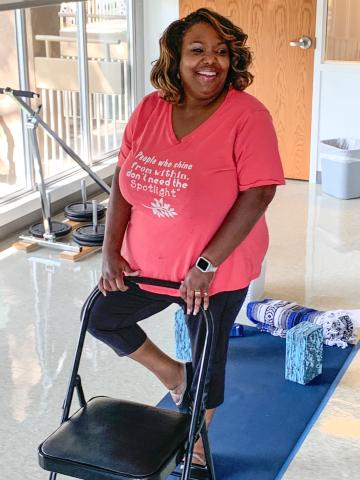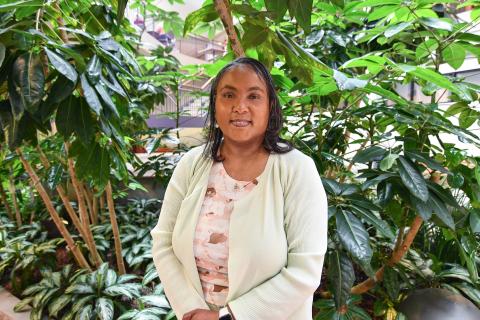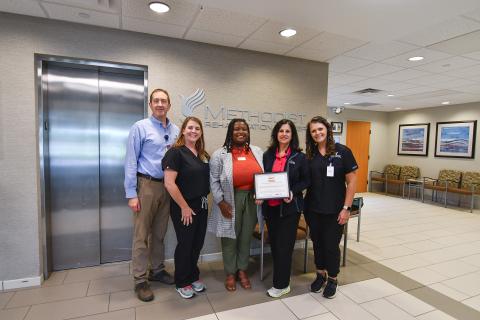
‘I am in such a better place, and now I want to help others’
Patients and health care advocates unite to meet unique challenges of minorities with multiple sclerosis



Before she knew she had multiple sclerosis, Eva Jackson hid her shaky limbs for fear it would compromise her career.
Now, she boldly embraces all things MS, even bedazzling her first cane.
“I am in such a better place, and now I want to help others,” said the National MS Society peer support leader in central Mississippi.
As a Black woman who struggled seven long years before being properly diagnosed, she’s determined to counter the dangerous delusion that Black people don’t get MS.
The misconception used to be a prominent theory, said Jackson’s physical therapist Lisa Indest.
“When I started practicing 30 years ago, MS was typically thought of as a Caucasian woman’s disease, usually after childbirth,” said Indest, the neurological therapy manager at Methodist Outpatient Therapy in Flowood, a division of Methodist Rehabilitation Center (MRC) in Jackson.
Today, the diversity of Indest’s patient roster proves MS is an equal opportunity disease. Yet outdated notions about minorities and MS still persist, said Jackson’s neurologist Dr. Mary Willis. The result is delayed diagnoses that come with considerable costs for MS patients.
“The longer it takes to get a diagnosis, the longer they will live their lives with significant disability,” said Willis, an associate professor and chair of neurology at the University of Mississippi Medical Center (UMMC) in Jackson and a physician dedicated to MS care.
“We have medicines to delay disability, but not yet any to repair damage,” she said. “We need education for the community so they recognize they have symptoms. And we need better education for medical providers to recognize symptoms and make referrals.”
Willis and MRC’s health care team often collaborate, bolstered by a 2014 affiliation between their two hospitals. The partnership led to the creation of the UMMC Neuro Institute, an umbrella organization for an integrated and multidisciplinary approach to neuroscience health and disease.
Both UMMC and MRC are also Partners in Care, a National MS Society designation that recognizes UMMC’s expertise in neurology and MRC’s in rehabilitation. Patients from both entities benefit by receiving streamlined access to the MS Society’s programs, services and resources.
Willis said people with MS often experience a multitude of symptoms, which is why they need both a neurologist and rehab team experienced in treating the disease.
For instance, Willis said she can access MRC services to help her patients with therapy for balance and walking, management of spasticity, the need for braces and strategies for energy consumption. And when her patients need wheelchairs, she can turn to MRC physical therapist Heather Maloney, a certified Assistive Technology Professional, for an expert fitting.
Jackson says the dynamic has certainly made a difference in her life.
“I am in a different place health-wise because of Methodist Rehab Center and my doctors,” said the 48-year-old Jackson resident. “I’ve told others: ‘If you are diagnosed with MS and you’re having trouble, go see MRC. They’ll help you resolve the issue.’
“They not only help you physically, but mentally,” she added, pointing to a MRC yoga class especially for people with MS. “They put people like us in the same environment so we can help each other.”
At MRC, the MS Society recently offered a Black MS Community Program, where Jackson shared her arduous path to a diagnosis.
When her arms started jerking in 2017, Jackson said it wasn’t seen as the myoclonic movements that can come with MS. Instead, she said her doctor at the time diagnosed dystonia, a muscle disorder that causes involuntary muscle contractions.
Soon, Jackson was falling because she was unable to lift her feet properly or stay balanced—another MS symptom. Yet when she reported the problem to a nurse practitioner, she says she was accused of faking it.
“It was put it in my medical records that my walking seemed exaggerated,” Jackson said. “And this is something Black people experience—not being taken seriously when they go in with the same symptoms as others.”
According to the MS Society, research indicates Black people with MS may have more aggressive disease progression and greater disability. This includes more walking, balance and coordination problems, more cognitive and visual symptoms, more frequent relapses with poorer recovery and earlier disability onset.
Yet many brush off early symptoms until they are too serious to ignore. Yolanda Pannell, a part-time administrative assistant at Methodist Rehab, said she kept making excuses for when she’d fall.
“I’d think, I must have hit a pebble on the ground,” Pannell said. “Or maybe I shouldn’t have worn those heels. I stopped wearing the heels, but I was still falling.”
She also had vision problems, sleep disturbances, heat sensitivity and something called an MS hug—a feeling of tightness or pressure around the chest or stomach. In her 50s then, Pannell figured maybe menopause was to blame. “Then my doctor said: ‘I think maybe you have MS.’”
A spinal tap confirmed the diagnosis, and Pannell began seeing Jackson neurologist Ruth Fredericks. “She literally saved me,” Pannell said. “I started taking Rebif and that has made a world of difference.”
Compared to many, Pannell was fortunate to find an experienced MS physician in a state with few neurologists and fewer still who want to treat MS patients.
“Right now, we have 70 neurologists in a state with a population of 2.9 million,” Willis said. “Many hesitate to see MS patients because of the number of symptoms that need to be managed and the rapid changes in medications and treatment approaches.”
While a challenge for physicians, the rapid growth of MS medications has been a modern day miracle for patients. In the early days, MS medications were so scarce, people were put in lotteries to determine who got a dose.
Today, the National MS Society website lists 25 FDA-approved medications that are used to modify the course of the disease, treat relapses and manage symptoms.
Therapeutic resources have also expanded. And as an MS partner, MRC has stayed abreast of the latest innovations.
At Methodist Outpatient Therapy in Flowood, Jackson got to use the clinic’s ZeroG Gait and Balance System as she worked on being able to lift her feet up and step over objects. The ZeroG protects patients from falls by providing dynamic body-weight support as they practice walking, balance tasks, sit-to-stand maneuvers and even climbing stairs. And MRC has two of only three such systems in the state.
“I almost fell one time, and it caught me,” Jackson said. And that gave her confidence to keep progressing.
“When I first started, I couldn’t go down a hallway and back without needing a rest,” she said. Next thing she knew, she was walking around the outside of the building and back—albeit at a modified pace and with a cane.
“I knew that was my new narrative, and I’m OK with it,” she said. “My focus now is to help others understand we didn’t do anything to have MS. We did not choose MS, it chose us. And we need to make a way to make things OK for us so we are not depressed, and we can have a good life.”
As someone who has a doctorate of Management-Organizational Development and Change, Jackson is excited to have a project like peer support to manage.
She’s scheduling two meetings a month for the group—one in person and one online. And it’s likely Jackson will lead each meeting with her signature positivity and flair. This is a woman, after all, who decorates her canes to match her outfits.
To learn more about the MS services available at Methodist Outpatient Therapy, call Heather Maloney at 601-936-8889.
To learn about upcoming meetings of the Central Mississippi MS Peer Support group, call 601-272-5625 or email cmmsgroup1@gmail.com.
